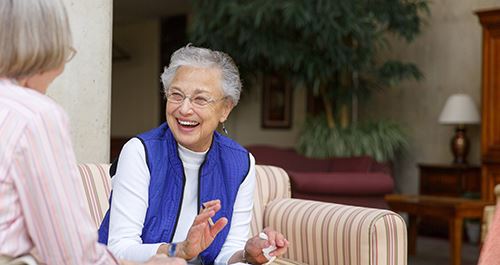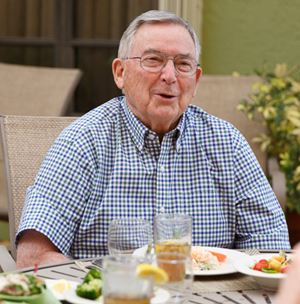
According to AARP, an overwhelming majority (87 percent!) of older Americans are concerned about cognitive decline. Since scientists still haven’t come up with a cure for dementia, this concern is not unfounded.
Is there anything we can do? Research has shown that mental exercises for seniors may play a huge role in staving off the brain’s decline. But what kind of exercises help and what can seniors and their caregivers do to ensure they’re getting the right kind of senior mental stimulation? One popular way is by playing brain games.
The Truth About Brain Games
Everyone knows about the benefits of staying physically fit —especially as we get older. Scientists are also now learning that staying mentally fit is just as important for successful aging. That’s why many doctors began advising their older patients to take up crossword puzzles or try brain games, with growing hope that mental exercises for seniors could keep Alzheimer’s or other types of dementia at bay.
But are puzzles and games enough? They represent a billion dollar industry, but according to Scientific American, they aren’t the golden solution. The truth is that as the body of brain research grows, scientists are finding that brain wellness is linked to other forms of wellness. That means it requires more than the simple types of mental exercises and games that have traditionally been recommended.
So, if brain games won’t do the trick, what will?
Brain Health is Related to Overall Wellness
For brain wellness, what seems to work better than simple phone apps or jigsaw puzzles is mental stimulation that engages older people on a broader scale. That is, if they want to stay sharp and hope to avoid dementia, seniors need to approach wellness from every direction.
According to Dr. Cynthia R. Green, President of Total Brain Health, older Americans need to be doing everything they can to stay mentally fit, and that includes staying both physically fit and socially sharp:
- Be aerobically active. Physical fitness keeps blood flowing to the brain, which helps form those all-important neural connections that aid memory and cognition.
- Stay social. The spontaneity of interacting with people engages the brain in different ways. Socializing challenges certain skills that we don’t use when we’re alone.
Dr. Green, whose company develops science-backed brain wellness programs for older adults, adds that social engagement is crucial because it optimizes the way we use our skills. Think of a social environment as having a multiplier effect on skill development and brain health.
One popular way for seniors to experience this mental stimulation is to take classes.
The Brain Benefits from Classes That Spark Curiosity and Engagement
Scientific American reported that scientists have found that learning new things helps improve cognitive functioning. They generally agree, too, that activities like taking classes are a much better way to spend your time, compared to brain games.
For these types of classes to have a positive effect, it’s important they follow a three-part model:
- Science-based. Class methodology should be based on science, which says wellness-based programs are better for the brain than games and puzzles.
- Social. The social aspect of classroom activities is key.
- Experiential. People get more out of a class when they’re experiencing what they’re learning.
What also helps is when classes teach the “why” behind the “what.” For example, let’s say a class is offered to help seniors adopt a healthy diet such as the Mediterranean Diet. In this case, it helps to teach the science behind that diet rather than simply helping students memorize what they should or shouldn’t eat.
Here are a few ideas for classes that can provide mental stimulation for seniors:
- Try learning a new language. Language is social, so the best way to learn (and to stimulate your brain) is to take a language class. And then practice in the wild.
- Tap into your inner artist. Creative projects like painting or pottery are some of the best types of mental exercises for seniors, especially if they’re done in a social setting.
- Develop a passion for wildlife. Bird watching is a good activity because it involves almost every aspect of wellness: it’s social, physical, and intellectual.
- Teach a class. Some seniors find that they have a lot to offer their communities. Teaching a class can help older Americans put their professional knowledge to good use, and it keeps the brain active.
How a Retirement Community Can Help
Retirement communities with opportunities for social engagement and physical activity can be extremely beneficial for residents. Being frequently engaged in social, physical, and mental activities not only helps with mental stimulation for seniors, but also helps them have a more positive outlook. Living in a social environment with lots of support can help seniors avoid depression and anxiety too. The University of Rochester Medical Center found that social activity may even help lower blood pressure.
A retirement community where there are multiple types of classes available provides residents with the opportunity to find activities they really enjoy. The more engaged they feel, the more likely they’ll be to keep taking the class.
Acts Communities: At the Forefront of Wellness
Some communities even go so far as to offer special programs designed specifically to target brain health. Acts Retirement-Life Communities is one such example, where each community offers what’s called the Total Brain Health Program (TBHP). According to TBH president, Dr. Green, “Acts has such a commitment to wellness, so they make a great partner for innovating together.”
TBHP follows the three-part model described above and provides seniors with mental stimulation and exercise for an enjoyable and sustainable way to take better care of their brains. Some Acts residents have even become teachers in the program.
The TBHP program speaks to a commitment to go beyond merely giving people information about wellness. It’s important that caregiving communities communicate their knowledge about science in ways that are meaningful. Programs like this one at Acts empower seniors to take better care of their brains. All the research is showing that such programs provide the right kind of mental exercises for seniors. The science is all there — it just takes initiative from innovative organizations like Acts to start incorporating such programs into their regular routines.
Every Acts resident has the opportunity to participate in the Total Brain Health program. We know the important role overall wellness plays in keeping older Americans healthy, engaged, and happy. You can see this in everything we do, from our health services and healthy dining options to the Total Brain Health program that provides the right kind of mental stimulation for seniors.






